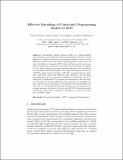Effective encodings of constraint programming models to SMT
Abstract
Satisfiability Modulo Theories (SMT) is a well-established methodology that generalises propositional satisfiability (SAT) by adding support for a variety of theories such as integer arithmetic and bit-vector operations. SMT solvers have made rapid progress in recent years. In part, the efficiency of modern SMT solvers derives from the use of specialised decision procedures for each theory. In this paper we explore how the Essence Prime constraint modelling language can be translated to the standard SMT-LIB language. We target four theories: bit-vectors (QF_BV), linear integer arithmetic (QF_LIA), non-linear integer arithmetic (QF_NIA), and integer difference logic (QF_IDL). The encodings are implemented in the constraint modelling tool Savile Row. In an extensive set of experiments, we compare our encodings for the four theories, showing some notable differences and complementary strengths. We also compare our new encodings to the existing work targeting SMT and SAT, and to a well-established learning CP solver. Our two proposed encodings targeting the theory of bit-vectors (QF_BV) both substantially outperform earlier work on encoding to QF_BV on a large and diverse set of problem classes.
Citation
Davidson , E , Akgun , O , Espasa Arxer , J & Nightingale , P 2020 , Effective encodings of constraint programming models to SMT . in H Simonis (ed.) , Principles and Practice of Constraint Programming : 26th International Conference, CP 2020, Louvain-la-Neuve, Belgium, September 7–11, 2020, Proceedings . Lecture Notes in Computer Science (Programming and Software Engineering) , vol. 12333 LNCS , Springer , pp. 143-159 , 26th International Conference on Principles and Practice of Constraint Programming (CP 2020) , Louvain-la-Neuve , Belgium , 7/09/20 . https://doi.org/10.1007/978-3-030-58475-7_9 conference
Publication
Principles and Practice of Constraint Programming
ISSN
0302-9743Type
Conference item
Description
Funding: UK EPSRC grant EP/P015638/1.Collections
Items in the St Andrews Research Repository are protected by copyright, with all rights reserved, unless otherwise indicated.

